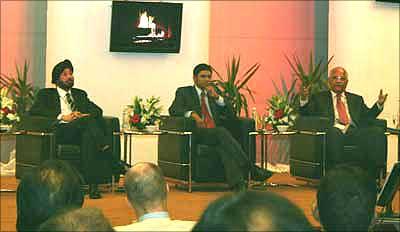 Can technology be the route to bring affordable healthcare to millions of rural Indians? This question was explored during the session on healthcare at EmTech2009 in New Delhi on Monday.
Can technology be the route to bring affordable healthcare to millions of rural Indians? This question was explored during the session on healthcare at EmTech2009 in New Delhi on Monday.
Guest speakers Dr Prathap C Reddy, Apollo Hospitals chairman, and Balvinder Singh Kalsi, DuPont India CEO, both felt that Indian villagers were ready and willing to adapt and experiment with technology if this route was chosen to provide them with access to healthcare.
While Kalsi cited his experience of connecting with the rural populace using the technological platform for their agricultural needs, Reddy described how his native village had embraced the concept of telemedicine and were very comfortable with it.
The session was moderated by Pranjal Sharma, executive editor, UTVi.
"The sense of adaptability to technology among rural populace is very high," said Kalsi.
Reddy cited how telemedicine had already touched 2,000 villages and a foundation had been laid for a health superhighway to make the promise of universal healthcare a reality at last. "We had this plan in our mind for at least 10 years, but did not have the technology or applications. Now these are available," he said.
The health superhighway envisages connecting a chain of hospitals -- both government and private sector -- through applications like telemedicine, mobile software and wireless networks so that doctors can connect with villages in India.
"We want to touch every single doctor in every corner of the country through a telemedicine network so that patients can not only get access to healthcare, but can get a doctor of their choice," said Reddy. Other prescriptions to bring 'good health' to a billion Indians included the adoption of a more 'pre-emptive' strategy.
"We have to focus on awareness so that we can postpone the age of lifestyle diseases: if a man is getting a heart attack today at the age of 40, can we push the age to 60 by an awareness drive," wondered Dr Reddy. If they have been able to do this in the United States, then we too can certainly do it, he said.
Image: (from left) Balvinder Singh Kalsi, president and CEO, DuPont India; Pranjal Sharma, executive editor, UTVi; and Dr Prathap C Reddy, chairman, Apollo Hospitals. | Photograph: Satish Bodas





